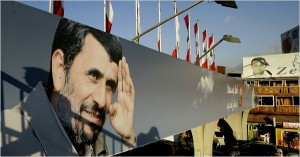The Next War
 How eager is Hezbollah for another conflict with Israel? On my last trip to Lebanon in September, I found both Hezbollah’s officials and the party’s rank and file feeling ready — bristling for a rematch, confident if not precisely eager. Hezbollah officials said they had doubled their fighting ranks (one said the number had tripled) since 2006. Supporters living in the border regions, like Aita al Shaab, said they had finally fully recovered from the last war and felt ready to fight again.
How eager is Hezbollah for another conflict with Israel? On my last trip to Lebanon in September, I found both Hezbollah’s officials and the party’s rank and file feeling ready — bristling for a rematch, confident if not precisely eager. Hezbollah officials said they had doubled their fighting ranks (one said the number had tripled) since 2006. Supporters living in the border regions, like Aita al Shaab, said they had finally fully recovered from the last war and felt ready to fight again.
Hezbollah supporters who time and again have lost their homes and livelihoods seem to embrace continued confrontation. What’s more, based on what they told me, they believe they’ll emerge at least as strong — politically and strategically — from another war as they did in 2006, even though nearly all of the people I interviewed thought the next conflict would be apocalyptic in its ferocity.
Lebanon has become even more polarized than it was in the years immediately after the 2006 war. Then the split worsened between those who support Hezbollah’s approach to Islamic Resistance and those who espouse a less confrontational course (and hold a majority in the government). There used to be a substantial pool of Lebanese in the middle; they wanted non-sectarian, non-confrontational politics for their country but who also sympathized with Hezbollah’s resistance project. By now, though, it seems that the soft middle has largely vanished. Most of the people I talked to were quite emphatic, either in their absolute loyalty to Hezbollah or in their absolute conviction that Hezbollah was ruining Lebanon.
I wrote about Hezbollah’s view of the coming conflict in today’s Times.
AITA AL SHAAB, Lebanon — It was from this shrub-ringed border town that Hezbollah instigated its war withIsrael in 2006, and supporters of the militant Shiite movement sound almost disappointed that they have not fought since.
“I was expecting the war this summer,” said Faris Jamil, a municipal official and small-business owner. “It’s late.” He has yet to finish rebuilding his three-story house, destroyed by an Israeli bomb that year.
In 2006, Hezbollah guerrillas crossed the border a few hundred yards from the town center, ambushed an Israeli patrol and retreated through Aita al Shaab with the bodies of two Israeli soldiers.
Hezbollah officials and supporters said they were now sending a pointed message to Israel through their efforts to rebuild, repopulate and rearm the south.
“We are not sleeping,” said Ali Fayyad, a Hezbollah official and member of Parliament. “We are working.” He receives visitors every weekend in a family home in Taibe, the site of a deadly tank battle in 2006.
Four years later, Hezbollah appears to be, if not bristling for a fight with Israel, then coolly prepared for one. It seems to be calculating either that an aggressive military posture might deter another war, as its own officials and Lebanese analysts say, or that a conflict, should it come, would on balance fortify its domestic political standing.

